Who We Are
Pronouns: she/her
Director of Counseling Services
Phone: 410-532-5379
Fax: 410-532-5167
Email: mallee@ndm.edu

Marie is a clinical psychologist with a broad background in school, college, and hospital mental health. Marie completed her Ph.D. at The New School for Social Research and trained at the Yale School of Medicine, at the Yale University Counseling Center, and with the Sheppard Pratt Health System. Marie has worked in a variety of residential and school treatment settings including special education, inpatient and outpatient eating disorders treatment, residential treatment, and in independent schools. Marie also maintains a private practice. Marie practices psychotherapy within a framework that integrates neuroscience, positive psychology, narrative therapy, self-acceptance, and a view toward lifelong growth.
As Director of the Counseling Center Marie oversees all aspects of the Counseling Center’s services, including outreach, psychotherapy, and support and consultation with students, parents, and faculty and staff, and the Notre Dame Community. Marie also provides supervision and training to the Counseling Center’s graduate level counselors. Marie is excited to be a part of the Notre Dame of Maryland community and its support of students, and is wholeheartedly committed to the support of diversity, equity, and inclusion.
Pronouns: she/her
Assistant Director of Counseling Center
Phone: 410-532-5434
Email: jhammond@ndm.edu
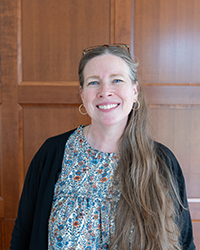
Luna is a Licensed Clinical Professional Counselor (LCPC) with a background in both counseling and education. She earned a Master’s degree in Education with a specialization in At-Risk Youth from Goucher College and later completed her clinical training with a Master’s in Mental Health Counseling from Johns Hopkins University. Luna has previously worked in higher education, both in admissions and within an academic resource center, and has also worked as a learning specialist and private tutor. For the ten years prior to joining NDMU, Luna ran a private psychotherapy practice, which she continues to maintain part-time.
As a clinician, Luna utilizes an integrated approach that combines Existential Humanism, Positive Psychology, and Psychodynamic theories. She focuses on cultivating a growth mindset with her clients, creating space to explore their personal stories, and acknowledging the universal human experiences of suffering, isolation, creating meaningful relationships, and finding one’s true purpose. Luna finds great joy in working with young adults and takes meaning from helping people “level up” in their lives.
Luna is the mother of two young adults and enjoys spending her free time with her family and friends. She values her strong social connections and finds joy in staying active within her community. Luna also dedicates time to her spiritual life, finding balance through personal reflection and engaging with spiritual literature. When she's not with loved ones, she enjoys drinking coffee and puttering around the house to avoid doing yardwork.
Pronouns: he/him
Psychology Extern
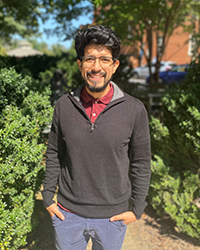
Diego is a 4th-year Clinical Psychology candidate at Loyola University Maryland, where he also earned his MS in Clinical Psychology. He obtained his M.A. in General Psychology from Pepperdine University and his B.A. in Psychology from CUNY Hunter College. Diego has gained experience working in a diverse range of settings, including the Loyola Clinical Center, Chase Brexton Health Care, the Anxiety and Stress Institute, and private practice. His work has also involved collaboration with social work and medical professionals, enriching his holistic approach to mental health care.
Diego specializes in anxiety-related disorders, depression, and interpersonal difficulties, with a focus on using culture as a foundational element in his practice. His passion for psychology stems from a deep commitment to helping clients navigate the complexities of their emotional well-being, offering services in both English and Spanish. Diego believes in creating a safe, compassionate, and open environment where individuals can explore their thoughts, emotions, and experiences without judgment. In this therapeutic space, he collaborates with clients to foster understanding, healing, and growth. Diego's integrative therapy style draws from a range of approaches, with strong foundational skills in psychodynamic therapy, while incorporating evidence-based modalities such as Cognitive-Behavioral Therapy (CBT), Acceptance and Commitment Therapy (ACT), and Interpersonal Process Therapy (IPT).
Pronouns: she/her
Psychology Extern
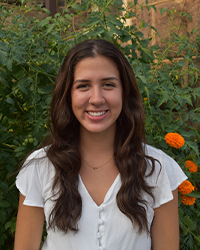
Gisele is a fourth-year doctoral student in the Clinical Psychology program at Loyola University Maryland. She earned her M.S. in Clinical Psychology from Loyola University and holds a B.S. in Neuroscience and Behavioral Biology from Emory University in Atlanta, Georgia. Gisele has extensive experience working with adults in both individual and group settings, including her work at the Loyola Clinical Centers, private practice, and a comprehensive Dialectical Behavior Therapy (DBT) practice. She has received specialized training in treating complex trauma and interpersonal difficulties. Other clinical interests include identity exploration, spirituality, and grief/loss.
In her therapeutic style, Gisele primarily utilizes a psychodynamic approach while integrating techniques from DBT and Acceptance and Commitment Therapy (ACT), such as mindfulness and values-based work. Her style is also informed by the interpersonal process, leveraging the therapeutic relationship as a powerful tool for fostering insight and healing. Gisele prioritizes bringing culture and collaboration into her work, creating an environment where clients can explore and embrace their identities. She is deeply committed to fostering self-acceptance while also empowering her clients to make meaningful changes and pursue the life they deserve and desire. Her curiosity drives her deep understanding of her clients' stories, allowing her to equip them with the insights and skills necessary for working toward acceptance of self. She firmly believes in the inherent potential for change and growth within each individual and considers it an honor to guide and witness this transformative process.
In her free time, Gisele enjoys going to concerts, playing tennis, roller-skating, exploring vintage markets, and traveling.
Pronouns: she/her
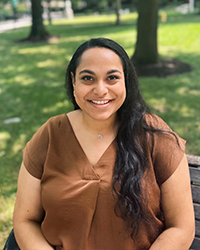
I am a current doctoral student pursuing my Psy.D. at Loyola University Maryland, where I completed my undergraduate work and received my master's degree in clinical psychology. My prior work has been with children, adolescents, and adults, including members of the LGBTQ+ community, with myriad presentations, concerns, and identities. My experience includes individuals experiencing body image distress and disordered eating, anxiety, OCD, ADHD, autism, and depression.
My therapeutic style is a joining of psychodynamic theory and acceptance and commitment therapy (ACT). I aim to help clients gain insight through practicing curiosity, observation, acceptance, and non-judgement of their inner emotional experience, while helping them move toward action that is consistent with their own values. This approach includes developing a deep understanding and appreciation for the clients’ cultural background and early childhood experiences that have shaped them as adults. I strive to create a trusting, empathetic, and brave space where clients can approach challenges with confidence and support!
Pronouns: she/her
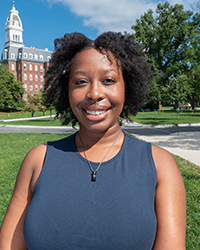
Jamie is a fourth year Psy.D. student in the clinical psychology program at Loyola University of Maryland. She completed her M.S. in clinical psychology at Loyola University of Maryland, and a B.A. in Psychology from Loyola University Maryland. Jamie has provided services in a variety of settings including the Loyola Clinical Centers, Mount Washington Pediatric Hospital, private practice, and assessment settings. Jamie has a special interest in working with adolescents and emerging adults, with focus on addressing anxiety, depression, ADHD, interpersonal communication skills, and identity development. Jamie’s therapeutic approach is informed by Cognitive Behavioral Therapy, Acceptance and Commitment Therapy, and mindfulness-based interventions.
Life transitions, daily-living, family dynamics, and cultural stressors are unique to each individual, and can impact your functioning in significant ways. This is why Jamie believes that in therapy you define your experiences! Jamie strives to engage and affirm your existing strengths, creativity, and abilities to support you through your identified challenges. She offers a validating space for you to deepen your sense of self and navigate life's challenges in a way that is consistent with your values
Pronouns: she/her
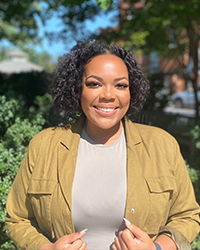
Amber M. Williams is a social worker, researcher, and clinician interested in the plight of historically oppressed populations. Amber’s background reflects an unwavering commitment to supporting trauma survivors, and advocating for underserved communities. With her unique blend of expertise in social work, psychology and research, Amber’s goal is to continue promoting social justice, equity, and mental well-being for those that have been historically marginalized.
While earning her MSW at the University of Southern California, she participated in research projects that aimed to improve wellness and resilience among people of color. Additionally, she piloted her own research on how negative police perceptions impact mental health in black communities. Amber is currently completing a PhD in Counseling Psychology at Howard University. Her research focuses on how the effects of racism may influence symptoms of learned helplessness.

